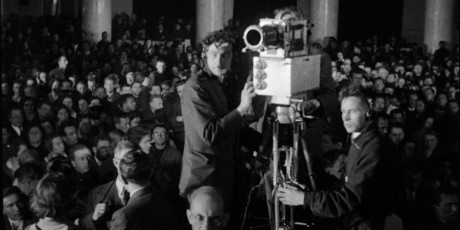


Sergey Loznitsa: The Trial

No doubt, Sergey Loznitsa is the master of making creative archive documentaries – a part of his impressive oeuvre that also includes fiction films and documentaries like “Austerlitz” – http://www.filmkommentaren.dk/blog/blogpost/3841/
in the archive films he stands out with films like “Blockade” (2005), “The Event” (2015) and “Maidan” (2014).
“The Trial” is more than two hours long, you have to be fresh in head and interested in history, I was the first one afternoon at DokLeipzig and I am more and more being drawn to films that deal with history, especially Soviet & Russian.
“The Trial” is astonishing. Let me give you the annotation from the Venice festival website, where it had its premiere:
“Moscow, USSR. 1930. The Pillar Hall of the State House of the Unions. A group of top rank economists and engineers is put on trial accused of plotting a coup d’état against the Soviet government. It’s alleged that they made a secret pact with the French Prime Minister, Raymond Poincaré, aiming to destroy the Soviet power and restore capitalism. All charges are fabricated and the accused are forced to confess to the crimes they never committed. The court delivers death verdicts. Unique archive footage reconstructs one of the first show trials, masterminded by Stalin. The drama is real, but the story is fake. The film gives an unprecedented insight into the origins of a deadly regime, which made the slogan “Lie is Truth” its everyday reality…”
To give you an impression of how the film looks like, go to https://www.youtube.com/watch?v=7wlNu32e01k
that is a three minutes long trailer of the film, made for IDFA where the film will have three screenings as part of the Masters section. The man speaking is Sitinin, working at a textile factory. He confesses to have been drawn into a group called “Industrial Party” – it never existed – that worked in sabotage against the Soviet government. Loznitsa lets the confessions go the whole way, confessions made through the 11-day process under excellent filming, where you see that the packed hall and its spectators again and again had to protect their eyes – from the sunshine or from the light put up for filming?
And again and again the prosecutor Andrey Vyshinsky (1883-1954) (who was also at the Nürnberg trials, Stalin’s man, who later became minister of foreign affairs and the Soviet representative at the United Nations) – again and again he brought up the question of the foreign involvement in planning an overthrow of the Soviet government.
How did this happen, said Vitaly Mansky in his talk at the festival in Leipzig. How could these intelligent men become shadows of themselves and confess something they never did? In the film you see that they all promise – if they are not shot – to remorse and serve the country loyally.
Vyshinsky is leading the Court of the Proletariat, the hall is full and applauds when death penalty is given to several of the accused – and Loznitsa brings in images from the streets where banners proclaim “death to the saboteurs”.
It’s an amazingly (film) historical documentation that Loznitsa presents in this 129 minutes long film shot in the 1930’es in the Soviet Union.
Actuality, Russia today…? Oh yes, in many ways.
Read the post below the background for the film written by the director.